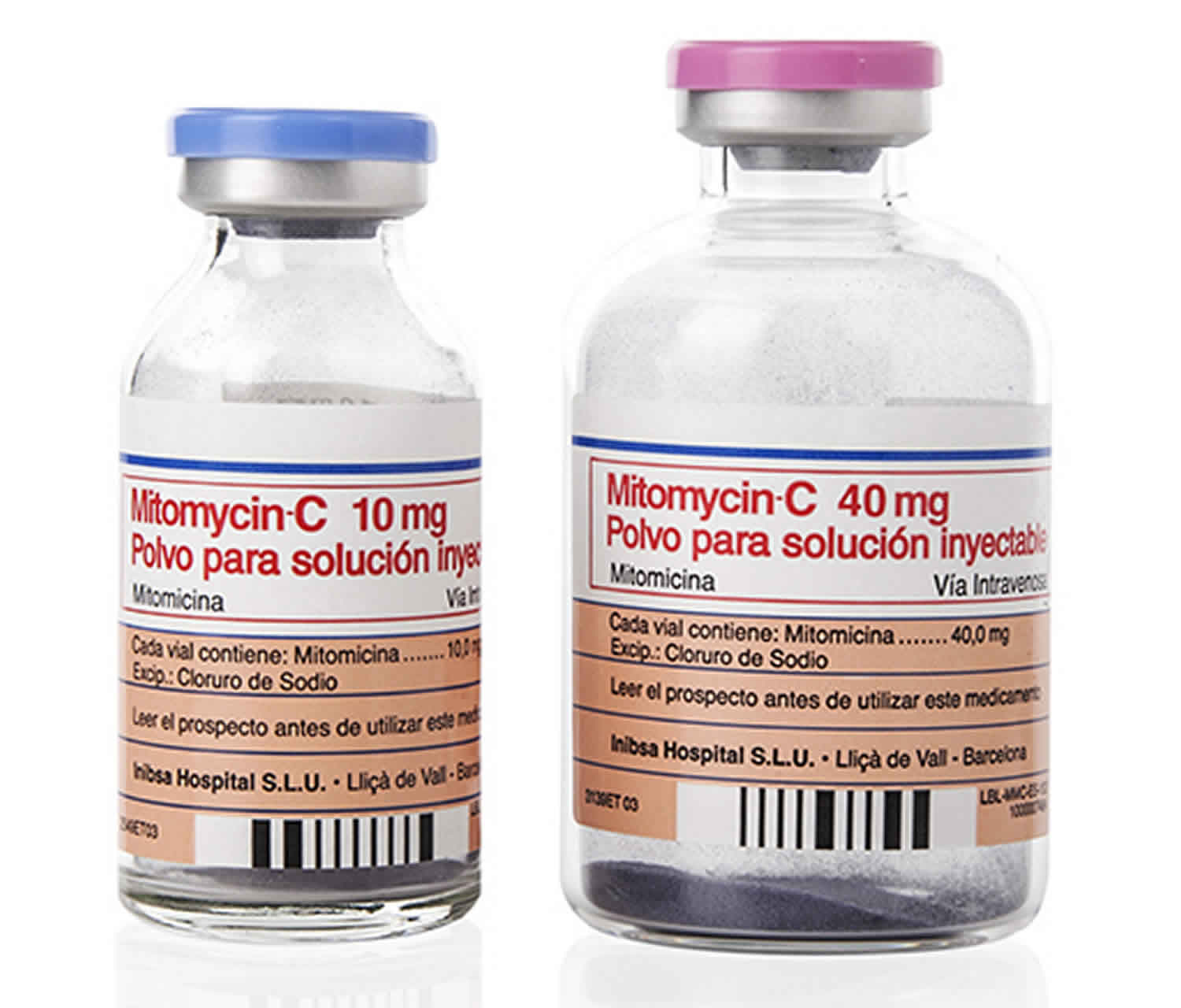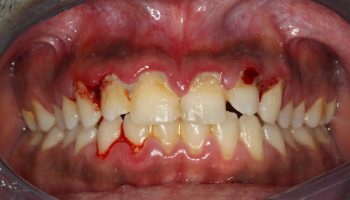Mitomycin
Mitomycin also known as Mitomycin C, is a type of antibiotic that is only used in cancer chemotherapy. Mitomycin C works by interfering with the development of the genetic material in a cell, the DNA. Mitomycin slows or stops cancer cells from dividing into 2 new cells and kills it. So it destroys quickly dividing cells, such as cancer cells. Mitomycin C is used in combination with other medications to treat cancer of the stomach or pancreas that has spread to other parts of your body and has not improved or worsened after treatment with other medications, surgery, or radiation therapy. Mitomycin is also sometimes used to treat anal cancer (cancer that begins in the anus), cervical cancer, a type of lung cancer (non-small cell lung cancer; NSCLC), and malignant mesothelioma (cancer in the lining of the chest or abdomen). Mitomycin is also sometimes used intravesically (infused directly into the bladder) to treat bladder cancer.
Mitomycin ophthalmic (for the eyes) is used during glaucoma surgery. Mitomycin ophthalmic is intended for topical application to the surgical site of glaucoma filtration surgery. Mitomycin ophthalmic is not for intraocular administration; if intraocular administration occurs, cell death may lead to corneal infarction, retinal infarction, and ciliary body atrophy.
Talk to your doctor about the risks of using this medication for your condition.
Mitomycin comes as a powder to be mixed with liquid and injected intravenously (into a vein) by a doctor or nurse in a medical facility. It is usually injected once every 6 to 8 weeks. You might have treatment through a thin short tube (a cannula) that goes into a vein in your arm each time you have treatment.
If you don’t have a cannula you have treatment through a long plastic tube that goes into a large vein in your chest. The tube stays in place throughout the course of treatment. This can be a:
- central line
- PICC line
- Portacath
For bladder cancer you have mitomycin C directly into your bladder. You have it through a tube called a catheter. This is called intravesical chemotherapy.
Your doctor may need to delay your treatment or change your dose if you experience certain side effects. It is important for you to tell your doctor how you are feeling during your treatment with mitomycin injection.
Ask your pharmacist or doctor for a copy of the manufacturer’s information for the patient.
Mitomycin can cause a severe decrease in the number of blood cells in your bone marrow. This may cause certain symptoms and may increase the risk that you will develop a serious infection or bleeding. If you experience any of the following symptoms, call your doctor immediately: fever, sore throat, ongoing cough and congestion, or other signs of infection; unusual bleeding or bruising.
Mitomycin may cause hemolytic uremic syndrome (a potentially life-threatening condition that involves injury to red blood cells, causing anemia and kidney problems). If you experience any of the following symptoms, tell your doctor immediately: red or bloody stools or diarrhea; decreased urination; swelling of the face, arms, hands, feet, ankles, or lower legs; or unusual tiredness or weakness.
Keep all appointments with your doctor and the laboratory. Your doctor will order certain tests before and during your treatment to see if it is safe for you to receive mitomycin injection and to check your body’s response to mitomycin injection.
Mitomycin injection must be given in a hospital or medical facility under the supervision of a doctor who is experienced in giving chemotherapy medications for cancer.
How is mitomycin given?
Mitomycin is injected into a vein through an IV. A healthcare provider will give you this injection.
Tell your caregivers if you feel any burning, pain, or swelling around the IV needle when mitomycin is injected.
Some people receiving mitomycin have developed ulcers on the skin where an injection was given, or on other areas of body. Skin changes may occur several weeks or months after a mitomycin injection. Call your doctor if you notice any redness, sores, oozing, or other skin changes during or after your treatment with mitomycin.
Mitomycin can weaken (suppress) your immune system, and you may get an infection more easily. Your blood will need to be tested often. Your cancer treatments may be delayed based on the results of these tests. Mitomycin can have long lasting effects on your body. You may need frequent medical tests for a short time after you stop using this medication.
Mitomycin special precautions
Before receiving mitomycin:
- tell your doctor and pharmacist if you are allergic to mitomycin, any other medications, or any of the ingredients in mitomycin injection. Ask your pharmacist for a list of the ingredients.
- tell your doctor and pharmacist what other prescription and nonprescription medications, vitamins, nutritional supplements, and herbal products you are taking or plan to take. Be sure to mention if you have every received doxorubicin (Adriamycin, Rubex). Your doctor may need to monitor you carefully for side effects.
- tell your doctor if you have a blood or bleeding disorder or if you recently noticed any unusual bruising or bleeding. Your doctor may not want you to receive mitomycin injection.
- tell your doctor if you have or have ever had kidney disease.
- tell your doctor if you are pregnant, plan to become pregnant, or are breast-feeding. You should not breast-feed during your treatment with mitomycin.
It is very important that your doctor check your progress at regular visits to make sure that this medicine is working properly and to check for unwanted effects.
While you are being treated with mitomycin, and after you stop treatment with it, do not have any immunizations (vaccinations) without your doctor’s approval. Mitomycin may lower your body’s resistance and there is a chance you might get the infection the immunization is meant to prevent. In addition, other persons living in your household should not take oral polio vaccine since there is a chance they could pass the polio virus on to you. Also, avoid persons who have taken oral polio vaccine. Do not get close to them, and do not stay in the same room with them for very long. If you cannot take these precautions, you should consider wearing a protective face mask that covers the nose and mouth.
Mitomycin can temporarily lower the number of white blood cells in your blood, increasing the chance of getting an infection. It can also lower the number of platelets, which are necessary for proper blood clotting. If this occurs, there are certain precautions you can take, especially when your blood count is low, to reduce the risk of infection or bleeding:
- If you can, avoid people with infections. Check with your doctor immediately if you think you are getting an infection or if you get a fever or chills, cough or hoarseness, lower back or side pain, or painful or difficult urination.
- Check with your doctor immediately if you notice any unusual bleeding or bruising; black, tarry stools; blood in urine or stools; or pinpoint red spots on your skin.
- Be careful when using a regular toothbrush, dental floss, or toothpick. Your medical doctor, dentist, or nurse may recommend other ways to clean your teeth and gums. Check with your medical doctor before having any dental work done.
- Do not touch your eyes or the inside of your nose unless you have just washed your hands and have not touched anything else in the meantime.
- Be careful not to cut yourself when you are using sharp objects such as a safety razor or fingernail or toenail cutters.
- Avoid contact sports or other situations where bruising or injury could occur.
If mitomycin accidentally seeps out of the vein into which it is injected, it may damage the skin and cause scarring. In some patients, this may occur weeks or even months after this medicine is given. Tell the doctor or nurse right away if you notice redness, pain, or swelling at the place of injection or anywhere else on your skin.
Allergies
Tell your doctor if you have ever had any unusual or allergic reaction to this medicine or any other medicines. Also tell your health care professional if you have any other types of allergies, such as to foods, dyes, preservatives, or animals. For non-prescription products, read the label or package ingredients carefully.
Pediatric patients
Although there is no specific information comparing use of mitomycin in children with use in other age groups, it is not expected to cause different side effects or problems in children than it does in adults.
Geriatric patients
Many medicines have not been studied specifically in older people. Therefore, it may not be known whether they work exactly the same way they do in younger adults or if they cause different side effects or problems in older people. There is no specific information comparing use of mitomycin in the elderly with use in other age groups.
Breastfeeding
There are no adequate studies in women for determining infant risk when using this medication during breastfeeding. Weigh the potential benefits against the potential risks before taking this medication while breastfeeding.
Drug interactions
Although certain medicines should not be used together at all, in other cases two different medicines may be used together even if an interaction might occur. In these cases, your doctor may want to change the dose, or other precautions may be necessary. When you are taking mitomycin, it is especially important that your healthcare professional know if you are taking any of the medicines listed below. The following interactions have been selected on the basis of their potential significance and are not necessarily all-inclusive.
Using mitomycin with any of the following medicines is not recommended. Your doctor may decide not to treat you with mitomycin or change some of the other medicines you take.
- Measles Virus Vaccine, Live
- Mumps Virus Vaccine, Live
- Rotavirus Vaccine, Live
- Rubella Virus Vaccine, Live
- Varicella Virus Vaccine, Live
- Zoster Vaccine, Live
Using mitomycin with any of the following medicines is usually not recommended, but may be required in some cases. If both medicines are prescribed together, your doctor may change the dose or how often you use one or both of the medicines.
- Adenovirus Vaccine
- Bacillus of Calmette and Guerin Vaccine, Live
- Cholera Vaccine, Live
- Dengue Tetravalent Vaccine, Live
- Hexaminolevulinate
- Influenza Virus Vaccine, Live
- Poliovirus Vaccine, Live
- Smallpox Vaccine
- Tamoxifen
- Typhoid Vaccine
- Vinblastine
- Yellow Fever Vaccine
Other interactions
Certain medicines should not be used at or around the time of eating food or eating certain types of food since interactions may occur. Using alcohol or tobacco with certain medicines may also cause interactions to occur. Discuss with your healthcare professional the use of your medicine with food, alcohol, or tobacco.
Other medical problems
The presence of other medical problems may affect the use of mitomycin. Make sure you tell your doctor if you have any other medical problems, especially:
- Bleeding problems
- Chickenpox (including recent exposure) or
- Herpes zoster (shingles)—Risk of severe disease affecting other parts of the body
- Infection—Mitomycin may decrease your body’s ability to fight infection
- Kidney disease—May be worsened
Mitomycin side effects
Mitomycin C common side effects. These side effects happen in more than 10 in 100 people (10%). You might have one or more of them. They include:
Increased risk of infection
Increased risk of getting an infection is due to a drop in white blood cells. Symptoms include a change in temperature, aching muscles, headaches, feeling cold and shivery and generally unwell. You might have other symptoms depending on where the infection is.
Infections can sometimes be life threatening. You should contact your advice line urgently if you think you have an infection.
Bruising, bleeding gums or nose bleeds
This is due to a drop in the number of platelets in your blood. These blood cells help the blood to clot when we cut ourselves. You may have nosebleeds or bleeding gums after brushing your teeth. Or you may have lots of tiny red spots or bruises on your arms or legs (known as petechia).
Breathlessness
You might be breathless and look pale due to a drop in red blood cells. This is called anemia.
Feeling or being sick
Feeling or being sick is usually well controlled with anti sickness medicines. Avoiding fatty or fried foods, eating small meals and snacks, drinking plenty of water, and relaxation techniques, can all help.
It is important to take anti sickness medicines as prescribed even if you don’t feel sick. It is easier to prevent sickness rather than treating it once it has started.
Occasional side effects
These side effects happen in between 1 and 10 out of every 100 people (1 to 10%). You might have one or more of them. They include:
- lung changes – which can cause shortness of breath, a dry cough or difficulty breathing
- skin problems including a rash, dry skin, blisters and itching
- soreness, redness and peeling on the palms and soles of your feet – this is called hand-foot syndrome or palmar plantar syndrome
- changes in how your kidneys work – you’ll have regular blood tests to check this
- inflammation around the injection site
Rare side effects
These side effects happen in fewer than 1 in 100 people (1%). You might have one or more of them. They include:
- an allergic reaction that can cause a rash, shortness of breath, redness or swelling of the face and dizziness
- mouth sores and ulcers
- diarrhea
- loss of appetite
- hair loss
- high temperature (fever)
- a blood disorder called hemolytic anemia
- changes to the way your heart works
- change to the way your liver works
Tell your doctor if any of these symptoms are severe or do not go away:
- nausea
- vomiting
- loss of appetite or weight
- sores in the mouth and throat
- headache
- fainting
- blurred vision
- hair loss
- loss of strength and energy
- rash
Some side effects can be serious. If you experience any of these symptoms or those listed in the IMPORTANT WARNING section, call your doctor immediately or get emergency medical treatment:
- pain, itching, redness, swelling, blisters, or sores on the skin especially near the injection site
- shortness of breath
- difficulty breathing
- fast, irregular, or pounding heartbeat
Mitomycin may cause other side effects. Call your doctor if you have any unusual problems while receiving mitomycin C.
Mitomycin ophthalmic side effects
Blebitis (eg, bleb ulceration, chronic bleb leak, encapsulated/cystic bleb, bleb-related infection, wound dehiscence, conjunctival necrosis, thin-walled bleb)
Corneal reactions (eg, corneal endothelial damage, epithelial defect, anterior synechiae, superficial punctuate keratitis, Descemet’s detachment, induced astigmatism)
Endophthalmitis
Hypotony that include choroidal reactions (eg, choroidal detachment, choroidal effusion, serous choroidal detachment, suprachoroidal hemorrhage, hypotony maculopathy, presence of supraciliochoroidal fluid, hypoechogenic suprachoroidal effusion)
Inflammation (eg, iritis, fibrin reaction)
Cataract development, cataract progression, capsule opacification, capsular constriction and/or capsulotomy rupture, posterior synechiae
Retinal pigment epithelial tear, retinal detachment (serous and rhegmatogenous)
Wound dehiscence
Vascular (eg, hyphema, central retinal vein occlusion, hemiretinal vein occlusion, retinal hemorrhage, vitreal hemorrhage and blood clot, subconjunctival hemorrhage, disk hemorrhage)
Other reactions (macular edema, sclera thinning or ulceration, intraocular lens capture, disk swelling, malignant glaucoma, lacrimal drainage system obstruction, ciliary block, corneal vascularization, visual acuity decrease, cystic conjunctival degeneration, upper eyelid retraction, dislocated implants, severe loss of vision).
Mitomycin C into the bladder side effects
Occasional side effects
These side effects happen in between 1 and 10 out of every 100 people (1 to 10%). You might have one or more of them. They include:
- skin problems including a rash, dry skin, blisters and itching
- soreness, redness and peeling on the palms and soles of your feet – this is called hand-foot syndrome or palmar plantar syndrome
- problems passing urine including pain, increased frequency during the day and night, and feeling unwell – this is due to bladder inflammation called cystitis
- blood in your urine (hematuria)
Rare side effects
These side effects happen in fewer than 1 in 100 people (1%). You might have one or more of them. They include:
- changes to your bladder wall including tissue damage or hardening
- your bladder holding less urine than it did before
- a hole in the bladder wall
Tell your team straight away if you have any of the following effects; severe abdominal (tummy) pain, problems passing urine or can’t pass it or blood in your urine.
After the treatment
If the urine touches your skin, the mitomycin C may cause a rash. For a couple of days after having this treatment you should wash your hands thoroughly with warm, soapy water. For the first 6 hours after treatment, you should also be washing your body parts too.
For 24 hours after treatment, you should not have sexual intercourse. For a week after each treatment, you and your partner should wear a condom.





